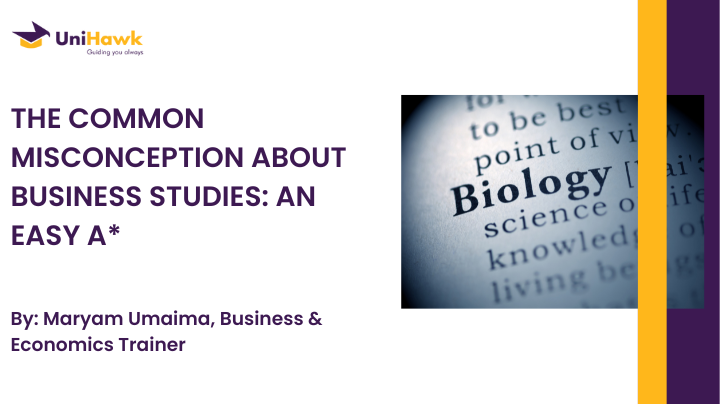Business Studies looks very easy at first glance. It’s misunderstood as the subject that offers an effortless A* for your A levels. While it is true that you are not boggled with complex formulas, extensive equations, or too many intricate theories (we have a few though), an A* (even a simple A or B) grade is only possible if you take the subject seriously.
So, today is the moment to recognize that attending classes alone won’t suffice for doing well in this subject. In this blog, I want to help students and parents understand the complexities of this subject and how Business students can achieve an A*.
Moving ahead: What is Business Studies composed of?
Business Studies focuses on concepts related to five main departments of a business: Marketing, Finance, Human Resource Management, Entrepreneurship, and Operations. While these may not involve extensive mathematical formulas, they require a profound understanding of multifaceted ideas and scientific theories, learning them and applying them to real-life cases.
The Reality of Business Studies
Business Studies is a subject that demands critical thinking, analytical skills, and practical application of knowledge. Students need to comprehend how businesses operate, understand market dynamics, internal and external business strategies and more. After learning these different areas, they then must analyse real-world scenarios, make informed decisions, and present coherent arguments while attempting the many case studies that come in their exam.
You may be thinking; ‘Okay, understood. Now, how do we reach an A*?’ (Good Question!)
Step 1: Plan your time for Business Studies. Sure, you may have Biology or Psychology or Physics or Maths as your other subject, and yes it needs more time than Business but you have to be ready to give at least half as much time to Business Studies. Start by allocating that time to the subject.
Step 2: After allocating time to your subject, read your textbook, learn the concepts and solve all the practice questions. They are there to help you, so do those first. Make sure to also make notes. In the past four years, I have seen one trend among all my A* students, they always make elaborate notes.
Step 3: For all the doubts you have, approach your school or external teacher. Take the help you need. A lot of times students come to me at the last minute before exams because the entire year they thought ‘Business is an easy subject, I can do it.’ Yes, you can! But you need help if you don’t understand the concept or are unable to build analytical skills so don’t be afraid to ask for help.
Step 4: Do five years of past exam papers. Solving past exam papers from the last five years helps you familiarise yourself with the exam format, types of questions, and common topics, ensuring you a good score.
Step 5: Continue to revise. Spaced Repetition is key. Continual revision through spaced repetition, where concepts are revisited at increasing intervals, helps solidify knowledge, improve long-term retention, and ensures a deeper understanding of the subject matter.
Business Studies is a subject that demands critical thinking, a profound understanding of various concepts, and the ability to apply theoretical knowledge to real-world situations. The business world is dynamic, and success in Business Studies requires dedication and effort. Your key takeaway from this article should be: Taking the subject seriously and investing in the time and effort needed to achieve your academic goals.
By: Maryam Umaima, Business & Economics Trainer




